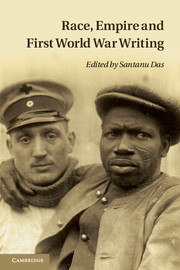Book contents
- Frontmatter
- Contents
- List of illustrations
- Acknowledgements
- Notes on contributors
- Introduction
- PART I VOICES AND EXPERIENCES
- 1 ‘An army of workers’: Chinese indentured labour in First World War France
- 2 Sacrifices, sex, race: Vietnamese experiences in the First World War
- 3 Indians at home, Mesopotamia and France, 1914–1918: towards an intimate history
- 4 ‘We don't want to die for nothing’: askari at war in German East Africa, 1914–1918
- 5 France's legacy to Demba Mboup? A Senegalese griot and his descendants remember his military service during the First World War
- PART II PERCEPTIONS AND PROXIMITIES
- PART III NATIONALISM, MEMORY AND LITERATURE
- Index
- References
5 - France's legacy to Demba Mboup? A Senegalese griot and his descendants remember his military service during the First World War
Published online by Cambridge University Press: 05 February 2014
- Frontmatter
- Contents
- List of illustrations
- Acknowledgements
- Notes on contributors
- Introduction
- PART I VOICES AND EXPERIENCES
- 1 ‘An army of workers’: Chinese indentured labour in First World War France
- 2 Sacrifices, sex, race: Vietnamese experiences in the First World War
- 3 Indians at home, Mesopotamia and France, 1914–1918: towards an intimate history
- 4 ‘We don't want to die for nothing’: askari at war in German East Africa, 1914–1918
- 5 France's legacy to Demba Mboup? A Senegalese griot and his descendants remember his military service during the First World War
- PART II PERCEPTIONS AND PROXIMITIES
- PART III NATIONALISM, MEMORY AND LITERATURE
- Index
- References
Summary
During the First World War, approximately 2 million subject peoples from Africa, Asia, and North America (including African Americans and Amerindians) were recruited to serve as soldiers in European and American armies. Unlike their Western counterparts, who left over one thousand published memoirs and millions of letters, diaries, and other written accounts of their experiences, these men, who were usually drawn from pre-industrial and non-literate or semiliterate backgrounds, left precious few records of their wartime ordeal. This essay seeks to redress this imbalance by introducing the oral history of a young Wolof griot, Demba Mboup (Figure 3), who was one of approximately 140,000 West Africans recruited into the French army to serve as combatants on the Western Front. In a brief postscript, differing interpretations by his daughter and grandson about the significance of Mboup's wartime service are offered to illustrate how the meaning of the war for West Africans was transmitted and transmuted across multiple generations, and its shifting significance over time.
Mboup's life history is only the third published memoir by a West African veteran of the First World War. Mboup's interview was one of 85 conducted in 1982–3 with Senegalese veterans or other witnesses of the First World War. Like Bernal Díaz's authoritative account The Conquest of New Spain, written in his mid seventies and with a preliminary note completed at the age of eighty-four, these African memoirs recorded in old age offer remarkable glimpses into their subjects' own youthful cross-cultural encounters.
- Type
- Chapter
- Information
- Race, Empire and First World War Writing , pp. 108 - 124Publisher: Cambridge University PressPrint publication year: 2011
References
- 10
- Cited by



